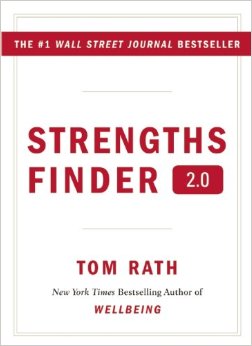What Are Your Strengths?
 What character attributes make you "you" and good at what you do? Lately, I have fielded a lot of questions about what I am doing with my digital history scholarship, my career, and my future. These questions have made me turn inward and ask: How do I articulate who I am, why I am good at what I do, and where I am going with my work?
What character attributes make you "you" and good at what you do? Lately, I have fielded a lot of questions about what I am doing with my digital history scholarship, my career, and my future. These questions have made me turn inward and ask: How do I articulate who I am, why I am good at what I do, and where I am going with my work?
As an avid podcast listener (I am a podcast junkie), I have heard many business podcasters mention the Gallup [simpleazon-link asin="159562015X" locale="us"]StrengthsFinder 2.0[/simpleazon-link] book and test. Based upon psychologist Donald O. Clifton's 40-years of research, StrengthsFinder 2.0 helps people recognize and better articulate their strengths of character.
The test consists of numerous questions that each taker must answer in 20 seconds or less. The whole test takes about 30 minutes to complete. The 2.0 part of the test involves the computer, which takes your answers, compares them with 34 of the most common strengths, and then produces a report that shows you your top 5 strengths and articulates what they mean for most people.
Admittedly, I was skeptical: Could a single test and computer algorithm tell me about my character? Could it help me articulate the essence of what makes me unique?
Much to my surprise the answer is "yes." The test articulated why I am obsessed with history, driven to succeed, and why I become discontented if I don't have some idea or problem to turn over in my head.
My Top 5 Strengths
1. Context: "You look back to understand the present...It is only by casting your mind back to an earlier time, a time when the plans were being drawn up, that the present regains stability...you make better decisions because you sense the underlying structure."
I guess this explains why I love history and why I became a historian.
2. Learner: "Whatever the subject, you will always be drawn to the process of learning. The process, more than the content or the result, is especially exciting for you...You thrive in dynamic work environments where you are asked...to learn a lot about new subject matter in a short period of time."
This makes sense. I prefer to hang out with brilliant people and I often seek to learn new skills, ideas, and technologies.
3. Achiever: "Achiever describes a constant need for achievement...By the end of the day you must achieve something tangible in order to feel good about yourself. And by "every day" you mean every single day--workdays, weekends, vacations....After each accomplishment is reached, the fire dwindles for a moment, but very soon it rekindles itself, forcing you toward the next accomplishment."
Honestly, I am shocked "achiever" didn't score number 2. I feel like I need to work all the time; I am happiest when I am working.
Before I took this test, someone asked me to describe my ability to accomplish all that I do. I compared myself to a racehorse. At first I stand in the starting gate starting down the field. This is my planning mode. I figure out what I need to do and how I am going to do it. Once I devise my plan of action, I bolt out of the open gate and run at full speed until I reach my goal. After I reach the finish line, I get back in the gate to run a different race.
4. Individualization: "Your Individualization theme leads you to be intrigued by the unique qualities of each person. You are impatient with generalization or "types"...you instinctively observe each person's style, each person's motivation, how each thinks, and how each person builds relationships...Because you are such a keen observer of other person's strengths, you can draw out the best in each person."
Individualization combined with my "Learner" strength articulates why I lead a rich interdisciplinary life; why I am a hybrid historian. I enjoy spending time with diverse groups of people. I appreciate how they have different interests from me. I may not always agree with their ideas, but I value them.
5. Analytical: "You Analytical theme challenges other people: "Prove it. Show me why what you are claiming is true"...You see yourself as objective and dispassionate. You like data because they are value free...Armed with these data, you search for patterns and connections. You want to understand how certain patterns affect one another."
I see patterns. I make connections. I devise plans to make patterns and connections that need to be made. My analytical side is my skeptical side. The side that requires me to craft strong, cogent and evidence-based arguments. My "Analytical" strength often works with my "Context" strength. This collaboration is why I sometimes get lost among the trees of a project.
Conclusion
Knowing more about my inherent strengths has helped me better understand and articulate who I am, why I am drawn to the projects I undertake, and why I will always be pursuing new projects.
Have you taken the test or a similar one? What are your strengths of character?